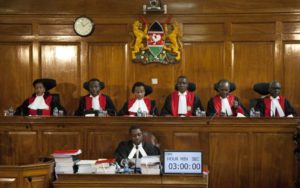
Kenya’s Supreme Court is hearing veteran opposition leader Raila Odinga’s challenge to President Uhuru Kenyatta’s re-election earlier this month. (AP Photo/Sayyid Azim)
NAIROBI, Kenya (AP) — Lawyers made their closing arguments Tuesday night to Kenya’s Supreme Court over a challenge by longtime politician Raila Odinga to Kenyan President Uhuru Kenyatta’s re-election earlier this month.
Odinga claims the declaration of Kenyatta’s victory with 54 percent of the vote was fraudulent, contending hackers infiltrated the electoral commission’s servers and manipulated results in the president’s favor.
The challenger’s lawyer, James Orengo, said the court should invalidate Kenyatta’s win because a scrutiny of forms used to tally presidential results showed many lacked security features that the electoral commission agreed on. He said the forms also were not signed, as required to ensure accountability. He said those anomalies affected nearly 5 million votes.
“Our case has proven forgery alteration of documents, trickery and deception has been used in various ways,” Orengo said.
Paul Muite, representing the electoral commission, said there is no law that specifies the forms for tallying presidential ballots must have security features.
Fred Ngatia, one of the attorneys for Kenyatta, urged the court to dismiss the challenge, saying there was no difference in the votes announced at the tallying center with those from the polling stations. That shows Kenyatta’s win was legitimate, he said.
Another Kenyatta’s lawyer, Ahmednasir Abdullahi, said Odinga’s petition did not meet the standard of proof needed to invalidate a presidential vote, calling it “an allegation of rumors.”
International election observer missions have said they saw no interference in the Aug. 8 vote. The electoral commission declared Kenyatta the winner three days later.
The court will make a ruling on petition Friday.
Also during his closing arguments, Orengo said the electoral commission had denied his team full access to the servers and other equipment that transmitted results from polling stations to the tallying center despite a Monday order from the Supreme Court allowing “read only” access. The challengers contend the servers contain information that show hacking and altering of votes.
Muite said it took time to comply with the order because the commission’s servers are based in Europe and the company that owns them is in the U.S. He denied officials had not given full access to the servers but said the multi-layered security made the process start late.
“You cannot be asked to nullify a presidential election on the basis of allegations, on the basis of suspicion. No one is challenging the numbers,” Muite said.
